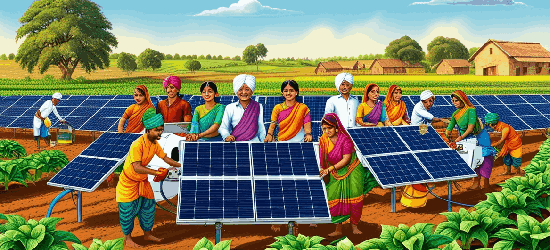Solar-powered farming: Experts call for scaled investment and policy reform

By Team Indoen
Posted on 22 Feb 2025
Tags: Solar
New Delhi: Scaling up solar-based technologies can transform agricultural productivity, reduce operational costs, and enhance food and energy security, according to industry experts at India Energy Week 2025. Speaking at a session titled Solar-Based Farm Mechanisation for Transforming Agriculture Across the Global South, leaders from various organisations underscored the need for innovative financing models and policy support to integrate solar energy into farming.
Ajay Mathur, Director General of the International Solar
Alliance, highlighted the rising demand for cereals and the necessity of
cost-effective solutions to meet this challenge. He pointed to key
solar-powered technologies such as solar pumps, solar cold storage,
agri-photovoltaic (Agri-PV) systems, and electric tractors as pivotal in
modernising agriculture.
However, he noted that while the technology exists,
financing remains a hurdle. "We need asset-based financing and guarantee
mechanisms to attract global investors," Mathur stated.
Echoing this sentiment, Harish Hande, Founder and CEO of
SELCO Foundation, stressed the importance of shifting from operational
expenditure financing to long-term asset-based models. He cited Meghalaya’s
capital loan initiative for women turmeric farmers as an example of an
effective financial innovation that could be scaled nationwide.
Representing the Federation of Indian Chambers of Commerce
and Industry (FICCI), Siraj Hussain outlined India’s progress in solar-powered
farm mechanisation. He pointed out that 400,000 solar pumps have already been
distributed under the Pradhan Mantri Kisan Urja Suraksha evam Utthaan
Mahabhiyaan (PM KUSUM) scheme and highlighted government-backed subsidies
for solar cold storage under the Mission for Integrated Development of
Horticulture (MIDH).
Swati Agarwal, Programme Officer at OAK Foundation,
emphasised the need for policy frameworks that not only support solar-powered
mechanisation but also integrate local workforce capacity building with crop
selection strategies. She advocated for aligning existing crop patterns with
solar energy applications to build farmer confidence before introducing new
crops. "Agri-PV holds immense potential, but awareness and training are
critical to its success," she noted.
Subhodeep Basu from ICRIER flagged the need for a more
farmer-centric approach. He argued that existing solar energy models in
agriculture are often driven by private enterprises or academic institutions,
limiting their direct benefits for farmers. He also stressed the lack of
research on the impact of solar energy on crop productivity. Citing Japan’s
soil norms and land-use standards, as well as best practices from China and the
U.S., Basu called for India-specific Agri-PV policies.
As India advances in solar-based farm mechanisation, experts agree that bridging the gap between technology, financing, and policy will be crucial in unlocking its full potential. With rising global interest in sustainable agriculture, the discussions at the last week concluded India Energy Week 2025 mark a step toward a more resilient and energy-efficient farming future.
Kindly follow us for updates on:
- India’s solar energy revolution: A path to 500 GW by 2030 and beyond
- India Energy Week 2025: Highlighting India’s growing energy leadership
- India charts bold renewable energy future with 500 GW target by 2030
- Trump’s tariff war with China could brighten India’s solar prospects
- Powering India’s green energy future
- India Achieves 850,000 Rooftop Solar Installations
- Bridging the energy gap: Off-grid solar for tribal electrification in India
- India’s rooftop solar scheme could drive $13.9 billion opportunity
- India’s Solar Surge: Milestones Of 2024 And The Road Ahead For 2025
- India’s Clean Energy Push Faces a Dirty Reality: Solar Waste